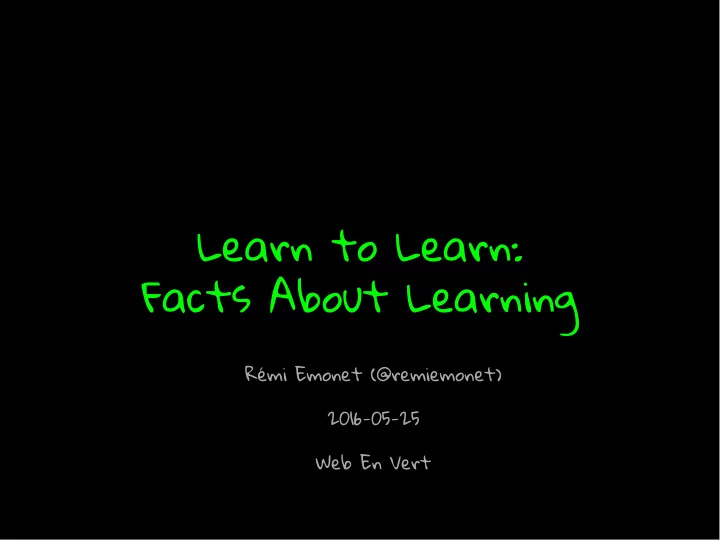

Learn to Learn: Facts About Learning Rémi Emonet (@remiemonet) 2016-05-25 Web En Vert
Tonight Personal Learning Facilitating Learning Resources 2 / 22 − Rémi Emonet (@remiemonet) − Learn to Learn: Facts About Learning
$ whoami
$ whoami Software Engineer Researcher: machine learning, computer vision Teacher: web technologies, computing literacy, … Geek: deck.js slides, isochrones, …
Personal Learning 5 / 22 − Rémi Emonet (@remiemonet) − Learn to Learn: Facts About Learning
The Importance of the Mindsets From Teaching Adolescents to Become Learners: The Role of Non-cognitive Factors in Shaping School Performance 6 / 22 − Rémi Emonet (@remiemonet) − Learn to Learn: Facts About Learning
Develop a Growth Mindset Fixed mindset intelligence is static think you are good in some area and bad in others and that it can't change Growth mindset intelligence can be developed believe you can learn anything if you put effort, work and practice 7 / 22 − Rémi Emonet (@remiemonet) − Learn to Learn: Facts About Learning
Take Care of Yourself Do sport stimulates neural development reduces stress Sleep well consolidates learning increase focus Meditate, concentrate on a side activity reduces stress improves concentration capabilities 8 / 22 − Rémi Emonet (@remiemonet) − Learn to Learn: Facts About Learning
Basics Techniques, Compared The scientific paper and a summary (from which the above table is taken) 9 / 22 − Rémi Emonet (@remiemonet) − Learn to Learn: Facts About Learning
Take Care of your Learning Plan your learning spaced/distributed/interleaved learning overview then details practice chunking (grouping ideas) Switch between thinking modes: focused vs diffuse Protect your learning cut distraction, avoid procrastination maximize focused attention ensure regular breaks Use handwriting 10 / 22 − Rémi Emonet (@remiemonet) − Learn to Learn: Facts About Learning
Tool: the pomodoro technique
Tool: flash cards
Tool: concept maps
Facilitating Learning 14 / 22 − Rémi Emonet (@remiemonet) − Learn to Learn: Facts About Learning
Key Points Be enthusiastic Know your "audience" levels: novice -> competent -> expert zone of proximal development, scaffolding Favor a sense of belonging fight the impostor syndrome watch Amy Cuddy don't use "just" Ensure the proper mindset 15 / 22 − Rémi Emonet (@remiemonet) − Learn to Learn: Facts About Learning
Growth Mindset Do Emphasize learning goals Praise people for effort Attribute success to working hard Embrace mistakes Model learning from mistakes Don't Focus only on performance goals Praise people for getting the right answer without trying Describe certain youth as "smart" Reinforce self-criticism Maintain a fixed mindset about your own expertise 16 / 22 − Rémi Emonet (@remiemonet) − Learn to Learn: Facts About Learning
Tool: sticky notes display completion ask for help answer MCQ provide feedback
Peer Instruction: just in time teaching Have people discuss and "teach" each others Use to debunk misconceptions anticipate pain points 18 / 22 − Rémi Emonet (@remiemonet) − Learn to Learn: Facts About Learning
Resources 19 / 22 − Rémi Emonet (@remiemonet) − Learn to Learn: Facts About Learning
Resources How Learning Works: Seven Research-Based Principles for Smart Teaching Book by Marie K. Norman, Marsha C. Lovett, Michael W. Bridges, Michele DiPietro, and Susan A. Ambrose Learning How to Learn: Powerful mental tools to help you master tough subjects MOOC by Barbara Oakley, Terrence Sejnowski Software Carpentry Instructor Training live website with the content that is used to train instructors involved in software carpentry Wikipedia zone of proximal development … peer instruction … 20 / 22 − Rémi Emonet (@remiemonet) − Learn to Learn: Facts About Learning
Keep On Learning
Thanks! Questions? twitter: @remiemonet web/email: http://home.heeere.com Recommended Links: see resources 22 / 22 − Rémi Emonet (@remiemonet) − Learn to Learn: Facts About Learning
Attribution 24 / 29 − Rémi Emonet (@remiemonet) − Learn to Learn: Facts About Learning
callion
silverfuture
geolawie
Anne Davis 773
tatadbb
Recommend
More recommend